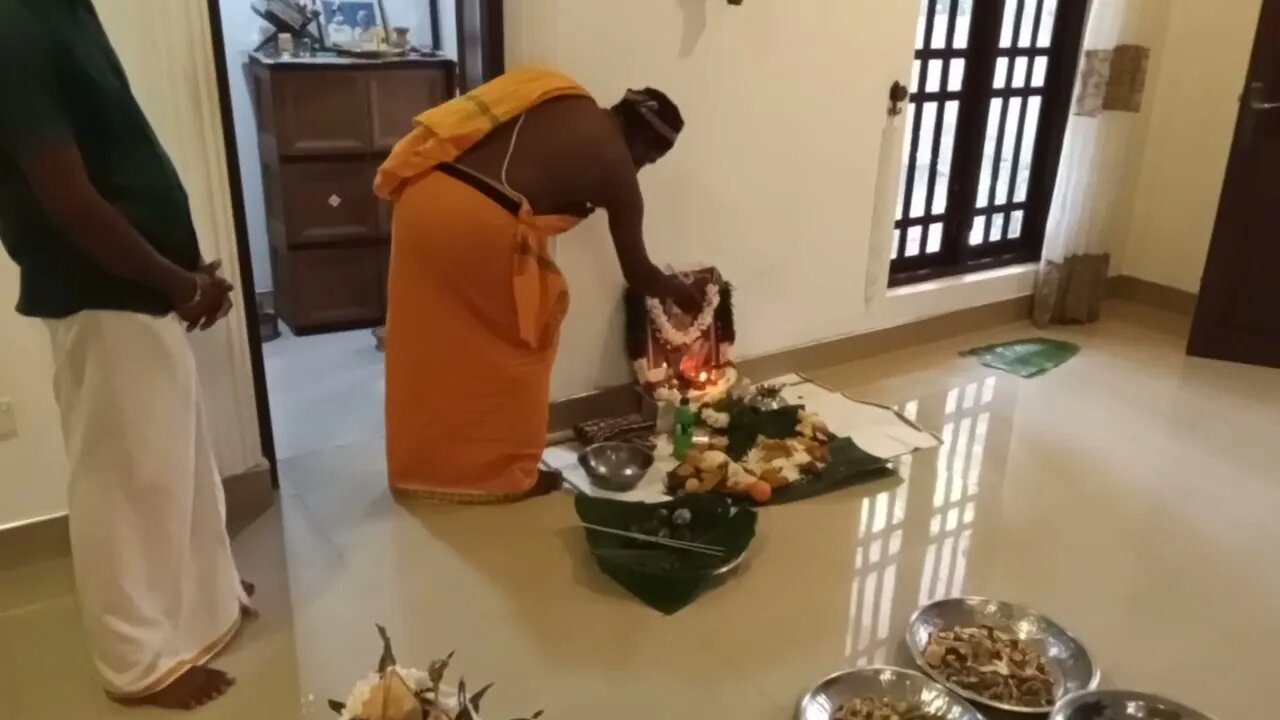Premium Only Content

Shraddha Puja ritual for Pitra Paksha
Pitru Paksha Puja and Shradh Rituals are important Hindu practices that are performed to pay respect and gratitude to the departed ancestors. They are believed to bring peace and prosperity to the family and help the souls of the ancestors attain liberation from the cycle of birth and death. Pitru Paksha Puja and Shradh Rituals are usually done by the eldest son or male relative of the family, but anyone can perform them with sincerity and devotion.
There are different ways to perform Pitru Paksha Puja and Shradh Rituals at home, depending on the region, tradition and preference of the family. However, some common steps are:
Prepare a list of the names and gotras of the ancestors who have passed away in the last three generations. You can also include other relatives or friends who have died and whom you wish to honour.
Choose a suitable date and time for performing the rituals, according to the tithi (lunar day) of the death anniversary of the ancestors. You can also perform the rituals on any day of Pitru Paksha, especially on Mahalaya Amavasya, which is the most auspicious day for Pitru Paksha.
Gather all the required items for the rituals, such as a wooden stool, a white cloth, black sesame seeds, barley seeds, rice, milk, honey, gangajal (holy water from Ganga river), kusha grass, pavitram (kusha grass ring), darbha grass, flowers, incense sticks, lamps, fruits, sweets, cooked food, water, copper vessel, spoon, etc.
Take a bath and wear clean clothes. Preferably wear a dhoti and angavastra (traditional garments for men) or a white saree (for women).
Place the wooden stool in the south direction and cover it with a white cloth. Sprinkle some black sesame seeds and barley seeds on it. This is the seat for the ancestors.
Place a photo or an idol of the ancestors on the stool. You can also place a kalash (pot) filled with water and decorated with mango leaves and coconut as a symbol of the ancestors.
Light a lamp and incense sticks near the stool. Offer flowers, fruits and sweets to the ancestors.
Take some water in your right hand from the copper vessel and sprinkle it on yourself as an act of purification. Then wear the pavitram (kusha grass ring) on your right ring finger.
Take some black sesame seeds in your left hand and hold some kusha grass in your right hand. Invoke the ancestors by chanting their names and gotras along with this mantra:
Om Namo Bhagavate Vasudevaya Pitrubhyo Namah Pitrubhyo Namah Pitrubhyo Namah
Offer water mixed with black sesame seeds to the ancestors by pouring it from your right hand through the kusha grass. This is called tarpanam (water offering). Repeat this three times for each ancestor.
Prepare pindas (rice balls) by mixing cooked rice with milk, honey and gangajal. Make one pinda for each ancestor and one extra pinda for all other unknown ancestors. Place them on a plate covered with darbha grass or banana leaf.
Offer the pindas to the ancestors by placing them on the stool one by one. Chant their names and gotras along with this mantra:
Om Namo Bhagavate Vasudevaya Pindam Tebhyah Samarpayami Pindam Tebhyah Samarpayami Pindam Tebhyah Samarpayami
Pray to the ancestors to accept your offerings and bless you and your family with happiness and prosperity. Ask for their forgiveness for any mistakes or sins you may have committed knowingly or unknowingly. Express your gratitude and love for them.
Offer cooked food to the ancestors by placing it on a plate or banana leaf on the stool. This is called bhojanam (food offering). You can also offer some jaggery and ghee as additional offerings.
Invite a brahmin (priest) or a cow or a crow to partake of the food offered to the ancestors. This is considered as a sign of acceptance by the ancestors. You can also donate some food, clothes, money or other items to a brahmin or a needy person as a gesture of charity.
Take some water in your right hand from the copper vessel and sprinkle it on yourself as an act of purification. Then remove the pavitram (kusha grass ring) from your finger and place it on the stool.
Bow down to the ancestors and thank them for their presence and blessings. Request them to return to their abode peacefully.
Dispose off the remaining offerings in a river or a lake or under a peepal tree.
Buy Spiritual Products from our Hindu Shop: https://linktr.ee/hindu_shop
Become a free member at the Spiritual Forum: https://ramabaktha.site/community/
-
 LIVE
LIVE
Barry Cunningham
41 minutes agoNEWS ON THE PLOT AGAINST THE PRESIDENT AND IT'S A MOVIE NIGHT!
2,140 watching -
 LIVE
LIVE
Glenn Greenwald
2 hours agoWorld Finally Horrified by Israel's Atrocities in Gaza; Mass Starvation Expert Warns of Spiraling Crisis in Gaza; AOC Votes to Fund Israel's Iron Dome | SYSTEM UPDATE #489
2,419 watching -
 LIVE
LIVE
SpartakusLIVE
1 hour agoMonday MOTIVATION || Games w/ the BOYS into the NIGHT
213 watching -
 59:57
59:57
Donald Trump Jr.
2 hours agoObama Behind the Russia Hoax, Full Coverage Live Lee Smith | Triggered Ep260
32.3K66 -
 LIVE
LIVE
ZWOGs
5 hours ago🔴LIVE IN 1440p! - PUBG, Star Wars Battlefront 2, Splitgate 2, VR Games, and More! - Come Hang Out!
109 watching -
 LIVE
LIVE
Blabs Games
2 hours agoGori Cuddly Carnage Part 1 | Noob Plays
61 watching -
 1:02:23
1:02:23
BonginoReport
2 hours agoHunter Denies West Wing Cocaine Was His!- Nightly Scroll w/ Hayley Caronia (Ep.94) - 07/21/2025
43.2K29 -
 LIVE
LIVE
The Jimmy Dore Show
1 hour agoTulsi’s New REVERSE Russiagate Investigation! Trump Breaks EVEN MORE Promises to MAGA! w/Dave DeCamp
5,833 watching -
 LIVE
LIVE
GloryJean
58 minutes agoGames w/ the BOYS Tonight 🔥 LOCK IN BABY
43 watching -
 2:52
2:52
Gamazda
2 days ago $1.02 earnedPiano Meets Rock: I Love Rock 'N Roll Cover
4.67K14